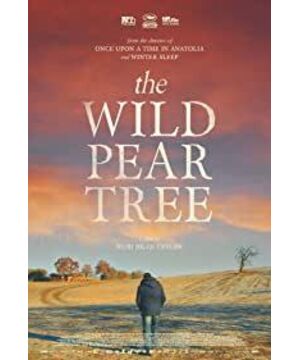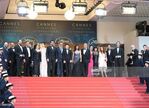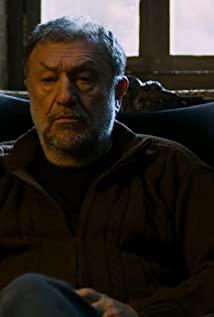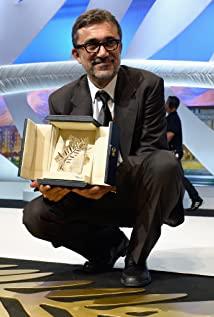Film and literature are inseparable, and the screenplay is one of the literary genres. There is a type of film that is more closely related to literature. It directly uses video to describe the ecology of writers (writers). For example, "Deeper than the Sea" directed by Hirokazu Koreeda tells the stories of many middle-aged writers who are frustrated. He, who once won a literary award, is now working in a detective agency. He is addicted to gambling and cannot afford the child support after the divorce. What's more, for example, the film "Genius Catcher", adapted from the biographical literature "Genius Editor", simply uses this literary anecdote by the gold medal editor Max Perkins to discover the writer Thomas Wolfe as the theme to tell the editor's story. And the writer's sympathy and mutual fulfillment.
The list goes on and on, and here's a film that reflects the living conditions of young writers. In the Turkish film "Wild Pear Tree", the protagonist Sinan is just like the creator who is precarious around us. His story may inspire those born in the 1980s, 1990s and 2000s who have the dream of being a writer.
The director of the film, Nuri Bilge Ceylan, is known as a "Cannes regular". So far, 6 feature films have been shortlisted for the main competition unit of the Cannes Film Festival. In 2003, Ceylon's "Far Away" won the Grand Jury Prize and the Best Actor Award at the Cannes Film Festival. This work is considered to be his famous work. In 2014, Ceylon won the Palme d'Or for Best Picture at the Cannes Film Festival for "Hibernation". "Wild Pear Tree" is Ceylon's work in 2018, and was also shortlisted for the main competition unit of the Cannes Film Festival that year.
Ceylon director's film style is obvious: the photography is exquisite, delicate and subtle, and he is good at interpreting philosophical speculations with dialogue, which can be classified into the category of literary and artistic films. The films he made are often two or three hours long, and "Wild Pear Tree" is 188 minutes long. Moreover, Ceylon does not pay attention to the so-called drama, and the dull daily life "with deep meaning" is his usual pursuit of film narrative. For example, in "Distant", a rural youth living in the big city (Istanbul) photographer's cousin's house goes out to look for a job during the day and comes back for a temporary stay at night.
Comparatively speaking, the plot of "Wild Pear Tree" has some ups and downs: Sinan, a literature lover, returned home after graduation, and hopes to publish the novel "Wild Pear Tree" written during his university at his own expense. He solicited sponsorships everywhere, looked for the mayor, and looked for a foreman, but he repeatedly hit a wall. His father owed a debt because he was addicted to betting on horses, and the family was so poor that sometimes they could not pay the electricity bill. He meets his first love and learns that he is about to marry an older jeweler. A classmate of his literature major who became a police officer told him that he would sometimes get angry at the explosion. He tried to take the teacher system and became a primary school teacher like his father, but failed. He sold the manuscripts left by his grandfather, and finally sold his father's beloved dog, and finally collected the funds to publish the book at his own expense - although the last book of that book was not sold. Reality is like an executioner who ruthlessly hangs Sinan's dream.
So, has the idealism of the literary youth Sinan finally shattered? It's hard to say, anyway, when he saw the newspaper clippings containing his novels in his father's wallet, and learned that his father was the only reader of his books, he was still moved. Sinan's father was actually an idealist, or still is. In order to dig a well on the top of the mountain, he built a humble dwelling nearby for a long time. Although, the well is still not dripping out. Drilling a well on the top of the mountain itself has the meaning of the Foolish Old Man moving the mountain.
Ideals may dry up, but family relationships will not. In the confrontation with his father that the contradictions escalated again and again, Sinan gradually realized the helplessness of reality, and saw the true colors of all kinds of people, until he reached a reconciliation with his father in the depths of his heart. In this countryside full of wild pear trees, he is the wild pear that his father called him, "unwell, lonely, twisted". This is not what his father looked like. Maybe in the end, Sinan will become a man like his father, working as a primary school teacher, and even tortured by poverty because of horse betting or other bad habits...
There are two dialogues that last an hour each. Once, Sinan was in a bookstore talking about the author's autobiography with a well-known writer, and once was walking on the road with two imams (Islamic priests) talking about religion and belief. The discussion with the writer broke up unhappily because of the different viewpoints. Discussions with imams about the Quran sparked a spark of exchange. One of the imams said, "The crime rate in atheistic countries is low, but the suicide rate is high."
"Wild Pear Tree" is rich. It shows the hero's mental journey of accepting reality calmly after "underappreciating talents" in sufficient space. It contains the grandeur of nostalgia and the timelessness of family affection. opinion. Or it is still asking: How to place our ideals in the hometown that cannot be returned?
(Originally published on WeChat public account "Daily Aesthetics")
View more about The Wild Pear Tree reviews











